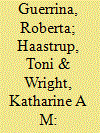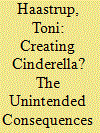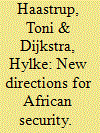|
|
|
Sort Order |
|
|
|
Items / Page
|
|
|
|
|
|
|
| Srl | Item |
| 1 |
ID:
193149


|
|
|
|
|
| Summary/Abstract |
Since 2014, several European Union (EU) member states have adopted their own versions of “Feminist Foreign Policy” (FFP). Increasingly, feminist bureaucrats, politicians, activists and scholars are calling for the EU to do the same. This article scrutinises claims to the feminist actorsness of the EU by introducing the analytical concept of Feminist Power Europe (FPE). In employing FPE the article examines whether the EU can adopt a FFP that upholds transformative potential of feminism. Undertaking critical content analysis of key documents, we identify three overarching feminist frames that emerge in the EU’s external policies: (1) Liberal; (2) Intersectional; (3) Postcolonial. We demonstrate that the EU’s propensity for a transformative feminist foreign policy is limited by the setup of global politics and the main drivers of European integration, which continue to be situated in a traditionally masculine environment and are defined by prevailing hierarchies. In undertaking this work, we highlight the constraints of advocating for the EU to adopt a FFP. This paper concludes by cautioning against the uncritical deployment of “feminism” in foreign policy articulation within an FPE configuration that excludes reflexivity about the EU’s external relations vision and indeed, its practice.
|
|
|
|
|
|
|
|
|
|
|
|
|
|
|
|
| 2 |
ID:
159777


|
|
|
|
|
| Summary/Abstract |
In 2000, the United Nations (UN) launched the Women, Peace and Security (WPS) agenda by adopting Security Council Resolution 1325. The agenda, among other things, called for the greater inclusion of women in peace negotiation practices and structures. While the European Union (EU) has made commitments to implementing the WPS agenda, the literature has not yet captured the institutional dynamics of the EU as it seeks to translate the WPS agenda into reality. This article takes stock of this hitherto excluded area of research. It argues that mediation is the ‘Cinderella’ of the EU’s peace and security institution because it has been ignored as a site for the implementation of the WPS agenda with important implications. Using a feminist institutionalist framework, the article shows the ways in which institutional practices of change aimed at including the new perspectives prompted by the WPS agenda lead to unintended gendered consequences.
|
|
|
|
|
|
|
|
|
|
|
|
|
|
|
|
| 3 |
ID:
184229


|
|
|
|
|
| Summary/Abstract |
South Africa's leadership has sought ethical foreign policy since the advent of democracy. This foreign policy outlook focuses on the African continent and includes certain articulations of pro-gender justice norms. In this article, I reflect on the extent to which South Africa's foreign policy embraces these norms as part of its foreign apparatus and practices. It takes at its starting point the nascent literature on feminist foreign policy applied to South Africa, which shares similarities to countries in the Global North that claim a feminist orientation to foreign policy. Moreover, it takes account of gender dynamics at the domestic level and how they are manifested in foreign policy discourses and practices, particularly in the understanding and implementation of the Women, Peace, and Security agenda. Utilizing qualitative content analysis, this article provides context and meaning for how gender concerns have evolved in South Africa's foreign policy, including the role of certain norm entrepreneurs in shaping the gender narrative. The article concludes that the domestic context is important to shaping and limiting how a country can enact feminist foreign policy. Importantly, the South African case provides a Global South dimension to the nascent scholarship.
|
|
|
|
|
|
|
|
|
|
|
|
|
|
|
|
| 4 |
ID:
159782


|
|
|
|
|
| Summary/Abstract |
This article concludes this special issue on the European Union as international mediator that set out to advance our theoretical and empirical knowledge about EU mediation. Providing a comprehensive reflection of EU mediation activities and the diverse settings where they take place, this concluding article identifies some connection points between the articles and discusses their findings on the motives/drivers, roles/strategies, effectiveness and institutional capacities of EU mediation. It discusses the implications of these findings for policymaking, focusing on the conditions for EU mediation effectiveness, the advantages of the multi-layered nature of EU mediation and the need for flexible adaptation of mediation strategies. Finally, the article sets the scene for future research endeavors on EU mediation by identifying three future research avenues that focus on the politics, domestic effects and comparative advantage of the EU as international mediator.
|
|
|
|
|
|
|
|
|
|
|
|
|
|
|
|
| 5 |
ID:
152382


|
|
|
|
|
| Summary/Abstract |
African security, particularly conflict-related political violence, is a key concern in international relations. This forum seeks to advance existing research agendas by addressing four key themes: domestic politics and peacekeeping; security sector reform programs; peace enforcement; and the protection of civilians. Each of the articles in this forum makes a case for analyzing African agency when it comes to African security. As a way of introduction, this short article sets out the main debates and concludes by providing further directions for future research.
|
|
|
|
|
|
|
|
|
|
|
|
|
|
|
|
|
|
|
|
|